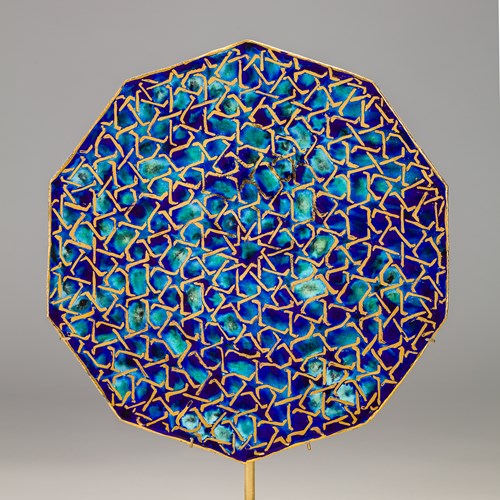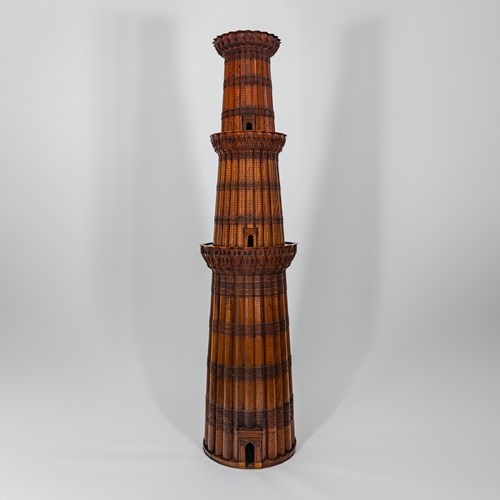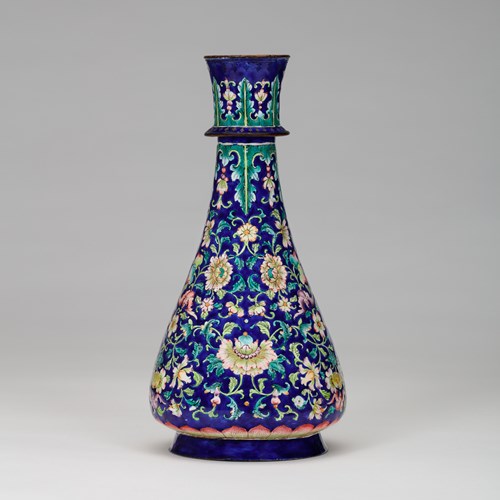Marketplace
Maharana Pratap Singh and his son Raj Singh
Maharana Pratap Singh and his son Raj Singh
Date 1750
Period 18th century
Origin Rajasthan, Mewar, Udaipur, India
Medium Ink, Gold on paper
Dimension 28 x 24 cm (11 x 9¹/₂ inches)
Pratap Singh II (b. 1724, r. 1751-54) had rebelled against his father in 1743 and was then imprisoned by his uncle Nathji for the remainder of Jagat Singh’s lifetime. After ascending the gaddi in 1751, he only lived for a few years. Here he stands facing his young son Raj Singh II (b. 1743, r. 1754-1761) who ruled longer than his father, but died very young. Where Pratap Singh was a man of great strength, concerned with his subjects’ welfare, Raj Singh had an unattractive nature and was eventually poisoned. Here he stands in namaskara and wears a white jama with a gold patka. He is decked in some simple jewellery when compared to that of his father.
Pratap Singh sports a luxuriant long moustache, seen in other portraits. He is nimbate and there is a faint crescent moon opposite his forehead, both signs of his status as Maharana. He wears an elaborate printed jama with the waist cinched by a bold pale blue and gold patka or sash. This offers a bold contrast to the subdued colouring his jama. He is decked with necklaces, anklets, rings, and bracelets and has a golden hilted dagger tucked into the patka. He extends his left hand to hold the sword rigidly erect before him and faces the diminutive figure of a young boy, the future Raj Singh II.
For a discussion of his life and the art of his period see: Andrew Topsfield, Court painting at Udaipur, Zurich, [2001], pp. 193-94. A portrait of Pratap is on page 196.
Pratap Singh sports a luxuriant long moustache, seen in other portraits. He is nimbate and there is a faint crescent moon opposite his forehead, both signs of his status as Maharana. He wears an elaborate printed jama with the waist cinched by a bold pale blue and gold patka or sash. This offers a bold contrast to the subdued colouring his jama. He is decked with necklaces, anklets, rings, and bracelets and has a golden hilted dagger tucked into the patka. He extends his left hand to hold the sword rigidly erect before him and faces the diminutive figure of a young boy, the future Raj Singh II.
For a discussion of his life and the art of his period see: Andrew Topsfield, Court painting at Udaipur, Zurich, [2001], pp. 193-94. A portrait of Pratap is on page 196.
Date: 1750
Period: 18th century
Origin: Rajasthan, Mewar, Udaipur, India
Medium: Ink, Gold on paper
Dimension: 28 x 24 cm (11 x 9¹/₂ inches)
More artworks from the Gallery









, A FORLORN HEROINE_T638411865822887245.jpg?width=500&height=500&mode=pad&scale=both&qlt=90&format=jpg)